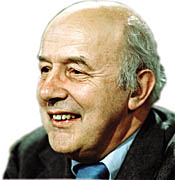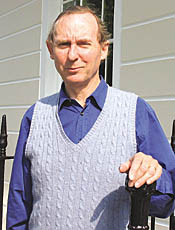|
|
 |
| |
|

John Betjeman

AN Wilson outside his Camden Home
|
Betjeman's great defender
A N Wilson's biography of John Betjeman shows the late poet laureate as a product of his Highgate childhood, writes Jane Wright
THE late Poet Laureate Sir John Betjeman once wrote: “I
think people’s lives are interesting only up until they
are 21.”
In a new biography of Betjeman, publication of which is set
to coincide with the centenary of the poet’s birth next
August, writer and biographer A N Wilson will clearly cover
the whole story until his death in 1984. But he states unequivocally
that John Betjeman was “utterly, completely and 100 per
cent” a product of his Highgate childhood.
Another north London man, Wilson tells me at his home in Regent’s
Park Terrace, Camden Town: “No one else would have written
Betjeman’s extraordinary poem Parliament Hill Fields. He’s
central to this area, the great genius of the place.”
The poem describes a boyhood tram ride home as Betjeman was:
Rocked past Zwanziger the baker’s and the terrace blackish
brown,
And the curious Anglo-Norman parish church of Kentish Town,
Until:
Soft the light suburban evening caught our
ashlar-speckled spire
Eighteen sixty Early English, as the mighty elms retire
Either side of Brookfield Mansions, flashing fine French window
fire.
Oh the after-tram-ride quiet when we heard a mile beyond,
Silver music from the bandstand, barking dogs by Highgate Pond.
Wilson has no truck with parodies of Betjeman’s style,
including the biographer’s Camden Town near-neighbour,
playwright Alan Bennett, who wrote the Betjeman-mocking poem
Place-Names of China.
Wilson says: “I hope to be the great defender of John Betjeman.
You have to be a genius to see poetry in what shampoo we use,
as he did. He focussed on the whole of life in this country,
including trains and office girls, which had never been done
in poetry before.
Wilson says that Summoned by Bells, Betjeman’s great 1960
autobiographical poem, which deals extensively with his Highgate
childhood is “in the same league as Wordsworth’s Preludes”.
Moreover, the biographer continues, Sir John had already found
his unique poetic style in until he was 10, before the family
moved to west London. (Betjemin’s parents actually lived
in Parliament Hill Mansions, Lissenden Gardens, when the poet
was born, before moving up to Highgate West Hill). At Highgate
Junior School he was taught by TS Eliot, to whom he solemnly
handed an early notebook of his poems. But Wilson says: “He
didn’t try and copy him. Rather than be an imitator, he
found his own voice from a very early age.”
Reassuringly for Betjeman fans in north London, his boyhood
home, of which he wrote: “Deeply I love thee, 31 West Hill,”
is according to Wilson, “still privately owned and more
or less the same, apart from the addition of a porch. A blue
heritage plaque will be put up there later this year to mark
Betjeman’s centenary.”
Also intact are the Anglican churches of St Anne’s and
St Mary Brookfield, where Wilson says he worshipped with his
parents, and which, “as the north London poems show”
sparked the religious life so fundamental to Betjeman, which
the biography aims fully to explore.
Indeed, Wilson continues, the buildings of Betjeman’s boyhood
were “the great inspiration” for another of his lifelong
passions, his love of Georgian and Victorian architecture and
his battles to conserve it. The biographer, author of The Victorians,
explains: “All the first buildings Betjeman saw were round
here, on walks with his father. And he could see proper architecture
in other people’s boring suburbs. He was incredibly learned
and knew every street in London backwards and did enormous amounts
of unpaid work to save a lost and wrecked Britain before conservation
was really invented.”
A founder of the Victorian Society and one-time editor of the
Architectural Review, the poet later became involved in the
unsuccessful 1960s campaign to save the original 19th-century
Euston station, together with its giant entry arch.
At Highgate Junior School, A N Wilson says: “He was very
badly bullied. It was the First World War and he had a German-sounding
name. Afterwards he lived with depression and terror all his
life, of reviews of his work, for example, which fits in very
well with his formative experience.”
Meanwhile, his cabinet-maker father Ernest’s factory showroom
on Pentonville Road, Islington, became a focus of what Wilson
describes as the poet’s “wallowing guilt,” after
only child Sir John refused to follow his father into the family
firm.
Wilson explains that Betjeman had “a very difficult relationship
with his father,” one of the reasons why he is not buried
with him in the family vault in Highgate West Cemetery, but
in Cornwall. He continues: “It wasn’t practically
possible for Betjeman to keep the firm going after his father
died suddenly in 1934. Yet I’ve discovered he actually
did a vast amount to help his mother find a buyer for it.”
So, 100 years on, what does Wilson see as Betjeman’s legacy?
He answers unhesitatingly: “His poetry. Though he changed
our way of looking at the past, he was a complete failure as
a conservationist, as all conservationists have been. He also
wrote a great deal of bad poetry as Poet Laureate, because the
subjects aren’t inspiring. But at least 25 of his other
poems are masterpieces, and that’s a very high proportion
indeed.”
Business Girls
From the geyser ventilators
Autumn winds are blowing down
On a thousand business women
Having baths in Camden Town
Waste pipes chuckle into runnels,
Steam’s escaping here and there,
Morning trains through Camden cutting
Shake the Crescent and the Square.
Early nip of changeful autumn,
Dahlias glimpsed through garden doors,
At the back precarious bathrooms
Jutting out from upper floors;
And behind their frail partitions
Business women lie and soak,
Seeing through the draughty skylight
Flying clouds and railway smoke.
Rest you there, poor unbelov’d ones,
Lap your loneliness in heat.
All too soon the tiny breakfast,
Trolley-bus and windy street! |
|
 |
|


